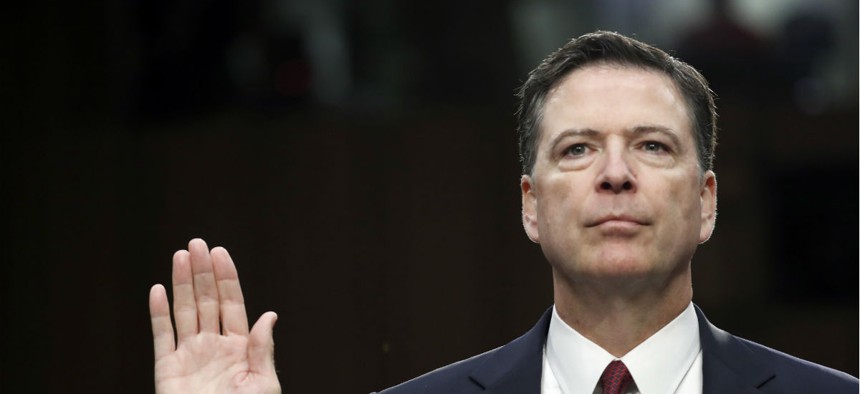Internal Emails Show FBI Agents Were Shocked and Shaken After Trump Fired Comey
After seeing the news on CNN, one special agent wrote, “I hope this is an instance of fake news.”
A trove of internal FBI emails released over the weekend shows the dramatic impact President Trump’s firing of then director James Comey had on the bureau’s workforce last May. The messages portray agents deeply shocked and saddened by the news, and they contradict Trump’s description of a bureau “in tatters.”
The blog Lawfare, run by Brookings Institution government studies Senior Fellow Benjamin Wittes, filed four Freedom of Information Act requests for the documents back in June. After the FBI delayed in answering, Wittes filed suit.
The resulting direct messages from special agents and field office heads show a reaction of “shock” and “profound sadness” at the removal of a “beloved figure to whom the workforce was deeply attached,” the blog said. “It also shows that no aspect of the White House’s statements about the bureau were accurate—and, indeed, that the White House engendered at least some resentment among the rank and file for whom it purported to speak.”
Most of the intra-staff emails expressed uncertainty about the May 9 firing, which FBI employees learned about from television news coverage of Comey during his trip to Los Angeles.
For example, Special Agent David Gelios, who led the Detroit office, wrote in a staff email, “I just saw CNN reporting that Director Comey has been fired by President Trump. I have no notification from HQ of any such thing. If I receive any information from HQ, I will advise….. I hope this is an instance of fake news.”
The head of the Knoxville field office, Special Agent Renae McDermott, wrote to her team expressing concern for their morale: “Unexpected news such as this is hard to understand but I know you all know our director stood for what is right and what is true!!! . . . He truly made us better when we needed it the most.”
The 103 released pages—with only 13 other pages withheld—is “neither a story of gratitude to the president nor a story of an organization in turmoil relieved by a much-needed leadership transition,” Lawfare wrote. It’s a contrast to characterizations by Trump in a famous tweet of a bureau “in tatters,” and the comments of his press secretary, Sarah Huckabee Sanders, who said that “the rank and file of the FBI had lost confidence in their director.”
The president, she added, had “had countless conversations with members from within the FBI” in the course of making his decision to fire Comey, Lawfare noted.
Within a few days of the firing, acting FBI Director Andrew McCabe (who since announced his retirement under pressure from the White House), testified to the Senate Select Committee on Intelligence that Comey “enjoyed broad support within the FBI" and that “the vast majority of employees enjoyed a deep and positive connection to Director Comey.”
A former FBI counterterrorism analyst now with Lawfare had written similar impressions of bureau employee loyalty to Comey in June, based on talks with 20 ex-colleagues. “Complete shock, followed by deep sadness,” was the general reaction to the firing, she wrote.
Wittes writes that the FOIA request was aimed at establishing a factual basis for those impressions that differ from the message from the White House:
In an organization “in turmoil,” one run by a “nut job,” in whom the rank and file have “lost confidence,” one might expect such an email to have a celebratory flavor, to talk about how the long national nightmare is over, say, or how there's a great opportunity to restore sanity to the organization.
But in fact, the emails showed that “no aspect of the White House’s statements about the bureau were accurate—and, indeed, that the White House engendered at least some resentment among the rank and file for whom it purported to speak, Lawfare noted.
Some of the internal emails suggest bitterness among FBI field officers. “On a personal note, I vehemently disagree with any negative assertions about the credibility of this institution or the people herein,” wrote Amy Hess, the special agent in charge in Louisville.
The emails describe a nationwide conference call acting director McCabe conducted, delivering a message described as “The FBI mission remains the same,” and saying there was no change in the bureau’s responsibility to “protect the American people and uphold the Constitution.” McCabe also seems to have emphasized the FBI’s role as “a stable, calming force in turbulent times—even when that turbulence involves the bureau itself,” the blog post said. “He made clear that all FBI employees should refrain from public statements on Comey’s dismissal.”
McCabe, Lawfare added, would later say he was not consulted on the issue of whether the fired Comey should continue to use a government aircraft to return to Washington—a move for which Trump himself criticized the bureau. McCabe, the blogger noted, said he would have approved Comey’s use of a plane for his last official flight, a courtesy his colleagues proceeded to arrange.
“You will not be surprised by the eloquence and grace of Director Comey, or by the genuineness of his message,” wrote David Schlendorf, assistant director for the FBI’s Human Resources Division when he circulated Comey’s farewell message to the workforce on May 12. “He will be missed.”




